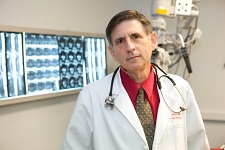Five UA Faculty Members Named Regents' Professors
Five University of Arizona faculty members David Breshears,Dr. Allan Hamilton, Barbara Mills, Steven Schwartz and Robert A. Williams Jr. have been named Regents' Professors by the Arizona Board of Regents.
The title of Regents' Professor serves as recognition of the highest academic merit and is an honor reserved for faculty members whose exceptional achievements merit national and international distinction.Regents' Professors have made a unique contribution to the quality of the University through distinguished accomplishments in teaching, scholarship, research or creative work. No more than 3 percent of the University's tenured and tenure-track faculty can carry the title.
All five will receive formal recognition at a campus ceremony in January 2019.
2018 Regents' Professors
David Breshears is a professor of natural resources in the College of Agriculture and Life Sciences and one of the world's foremost authorities on understanding the root cause of tree deaths, which are occurring on a massive scale. Breshears has played a central role in identifying, diagnosing and communicating to a wider audience this threat to ecosystems. In particular, he has detailed the degree to which loss of trees is due to a lack of sufficient water and exacerbated by the rise in temperatures.
An acclaimed teacher, mentor and science communicator who can work across disciplines, Breshears has played leadership roles in national organizations, including the Ecological Society of America, the National Ecological Observatory Network and the National Phenology Network. He also is a major contributor to interdisciplinary research such as the UA's Critical Zone Observatory project, which focuses on the interface of geology and biology.
Dr. Allan Hamilton, a decorated U.S. Army officer and surgeon,is a UA professor of surgery, psychology and electrical and computer engineer. He joined the College of Medicine Tucson in 1990 to head the new brain tumor division. Hamilton led a team that devised and built the first extracranial stereotactic radiation delivery system, treated the first 13 patients in history with extracranial stereotactic radiosurgery and launched a breakthrough in the treatment of extracranial cancer.
He became the youngest chairman of the UA's Department of Surgery in 2000. He is the executive director of the UA's Simulation Technology and Education Center, securing donations for its creation in 2004. The center is the first non-patient-based medical training center to have its own artificial tissue lab and, early on, was one of only five centers in the country to receive full accreditation for education and training, research, systems integration and assessment.
Hamilton was selected in 2017 as one of 16 simulation scholars from around the world to participate in the annual Comprehensive Medical Simulation Leadership Curriculum at Harvard Medical School, and he has been selected three times for the Vernon and Virginia Furrow Award of the Academy of Medical Education.
Barbara Mills is a professor of anthropology in the College of Social and Behavioral Sciences and a specialist in Native American ceramics. Mills, the first woman professor of Southwestern archaeology and the first woman to head the School of Anthropology at the UA, has embraced modern technological ideas to solve centuries-old questions and problems. Her use of big data, which can be broken down into analyzable subsets, is one of the first applications of this approach to regional American archaeology. Her applications of Social Network Theory to study traditional Native American centers through the computer analysis of their artifacts have led to a recent series of publications detailing more about the history of the Southwest.
Through funding from the National Science Foundation and the National Geographic Society, Mills also worked to have Native Americans participate in the excavation of their own cultural artifacts and encourage young members of Southwestern tribes to engage with the UA through scholarships and training, an example of the UA archaeological community's close collaboration with Native peoples of the area.
Steven Schwartz is a professor of chemistry and biochemistry and of applied mathematics in the College of Science, as well as a fellow of both the American Association for the Advancement of Science and the American Physical Society. He has carried out groundbreaking work in theoretical biophysical chemistry and his research provides a dynamic view of how fast motions one-quadrillionth of a second are linked to chemistry at enzymatic catalytic sites, changing the worldwide view of how enzymes function.
He also has made major contributions to the study of the control mechanism of beating heart muscle, the cardiac thin filament, creating the only complete atomic-level molecular model of thin filament. This work could lead to a treatment for hypertrophic cardiomyopathy, the leading cause of sudden cardiac death among young people worldwide.
Across campus, he has made substantial contributions to the UA's shared governance, making it possible for others to excel, and he serves as chair of the Committee of Eleven.
Robert A. WilliamsJr. is the E. Thomas Sullivan Professor of Law at the James E. Rogers College of Law and faculty co-chair of the college's Indigenous Peoples Law and Policy Program. In creating the program, Williams established an academic meeting ground for Native peoples in Arizona, the U.S. and across the world to pursue legal training, come together for workshops and conferences, and make change happen in their communities back home.
A noted authority on a wide range of legal topics who has litigated cases before the U.S. Supreme Court and international human rights bodies, Williams also developed a yearlong course for Arizona Law's Bachelor of Arts in Law, the first of its kind in the country. The degree quickly has become the University's fastest-growing major, with more than 900 students, more than half of whom are women and members of underserved communities.
A list of current and previous Regents' Professors at the UA is available online.

